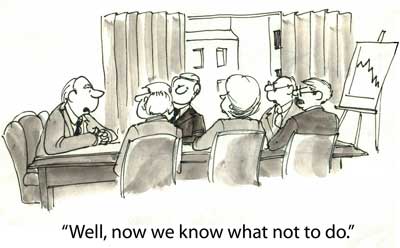Categories
Archives
Search
Subscribe to Our Monthly Digest

Learn from mistakes…grow from successes
I have coached and trained almost my entire career. Helping others achieve growth means leading people out of their comfort zones so that they may enjoy a desired new ability. Here is a key fundamental: We learn from our mistakes and we grow from our successes. I share this example:
A couple weeks ago on Christmas day a neighbor boy came to our door and asked if he could use our driveway to practice learning to ride his new bike. His driveway led into the street, and ours ended in our yard…much safer!
He mounted his new bike with his sparkling spokes and was ready to take the plunge. Since I spend so much time coaching people, I couldn’t resist offering a couple tips: First, I had him start with the right pedal up so that he could get a good start. Second, I encouraged him to pedal hard while looking straight ahead. Don’t look down! He took off and was tempted to look down. I stopped him and yelled, “Keep looking straight ahead!” He did. He had a success and made it all way to the end of the driveway. We repeated it three times, and we had three good outcomes. There were no falls. He was excited, and ran in to tell his Mom and Dad.
My goal in coaching him was not to have him learn by mistakes, rather to grow from his successes. Let’s face it, falling off a bike isn’t too motivating for most people. The lesson learned here is while we may learn from our mistakes, we grow from our wins. Think about it: If the only way we learned was from making mistakes, then the person in Illinois who had the most traffic accidents would be considered the best driver. Would you want to drive with him/her?

Growth-oriented teams are not afraid to make mistakes
Several years ago I was working with a successful business owner (Joe) who was looking to expand his business considerably. He knew that meant hiring more people, and counting on them to be an extension of his beliefs in hard work, integrity, and doing things with excellence.
 Moving forward, there was one thing that bothered Joe…Mistakes! When members of his team made a mistake, there was a tendency to blame others, make excuses, or “sugar coat” things. When any of these things would happen, solving the problem would become more difficult and the consequences would be more serious. Joe asked me to help him understand the resistance of his team members to own up to mistakes and report them quickly.
Moving forward, there was one thing that bothered Joe…Mistakes! When members of his team made a mistake, there was a tendency to blame others, make excuses, or “sugar coat” things. When any of these things would happen, solving the problem would become more difficult and the consequences would be more serious. Joe asked me to help him understand the resistance of his team members to own up to mistakes and report them quickly.
After talking with Joe’s team members, the cause of this problem became very apparent: Joe’s team was afraid to admit it when they made a mistake, and this fear caused them to hesitate coming forward. Joe is a “right-right” person and when his team members fell short with a customer, he would go into a fit.
When I reported my findings back to Joe, he said, “When I have a tantrum, I am not upset at someone, I am just mad we fell short with a customer.” I replied, “That may be so, but your people think you are mad at them.” Problem solved! We had a team meeting and Joe explained to his team what he had told me. His staff agreed to give Joe permission to have a tantrum when a mistake was made. Once he is finished letting off steam, they all get busy and solve the problem. Joe’s people are now quick to own up to to their errors and communicate them right away. These changes have led to a stronger, more confident, and collaborative team. They also have more fun!

Keep your team accountable
“The reason there were so many heroes at the Alamo is that there was no back door”
Whether we are a parent, boss, or in charge of a team, we need to be a good teacher. What do good teachers do? You remember. Think of our favorites growing up. They believed in us, they wanted us to grow and prosper, and they would not let us sell ourselves short. We don’t do much growing in our comfort zone.
There are two types of delegation: One is designed to increase someone’s ability and confidence, and the other is for work distribution.
When I was in 5th grade, my teacher, Mrs. McGinness delegated a project to me. She appointed me editor of the class yearbook. It was a big project, and I didn’t think I could do it. Mrs. McGinness made me believe that I could.
To get started, I needed to break the job into “bite-size” chunks. If I hadn’t, it would have been overwhelming. I shared this list of tasks with Mrs. McGinness, and she directed me to put deadlines on each one. Then she checked in with me on each deadline to make sure I didn’t run into a snag. Losing steam was not an option. There were times when I got overwhelmed, and wanted her to help with the load. Nope. It was my “baby” she told me. I persevered and, if I may say so, did a pretty good job. Mrs. McGinness knew the magic phrases that kept me accountable and prevented her from “buying it back” Here were a few:
- I know you can do it…
- I am counting on you, Steve…
- What is your new plan of action?
- What are you going to do about it now?
- What is plan B?
Mrs. G kept me moving forward. That is what strong leaders do!

Great companies stay creatively alive!
I’ll start with two words: Apple and Disney. These names don’t just stand for some products or services. When we hear these names it can trigger the “kid” in us. For decades these companies have never seemed to lose their enthusiasm and continuous profitability. Instead of becoming too set in their ways, they believe in the old maxim, “Yesterday’s methods produce yesterday’s results”. Apple and Disney are driven by innovation and constant reinvention. What does it take to have these qualities? Perhaps we need to go back to our childhood to find out.
Many years ago, NASA did a study of 1600 individuals from infancy to adulthood. The goal was to measure the percentage of creativity in all the actions they observed:
Ages 1-5: 98%
Ages 6-10: 35%
Ages 11-15: 12%
Ages 16-20 5%
We know these observations are true. Just watch an infant during their waking hours. A couple of weeks ago I was babysitting for my 8-month old grandson. He was in the playpen and for all his time he was playing with toys, practicing his crawling, or keenly noticing his surroundings. Before we know it, he will be attending school, and will begin the process of learning the rules of life. He will also begin to sacrifice some of his creativity for compliance.
What can we do as teachers, coaches, bosses, and parents to make sure we tap into the creativity of our team member? First, we need to build a working environment that encourages idea fluency. To do this, we start with brainstorming. This step focuses on the quantity of ideas – not the quality. We get all our thoughts on the table. To successfully perform this step, we need to outlaw any “judgment” or “red-light” language. Here are some examples:
- “We tried that once”
- “We’re different”
- You can’t…”
- “It won’t…”
- “We have never…”
- “We don’t do things that way”
- “It’s not practical”
- “It’s against tradition”
- “That is not our responsibility”
- “It’s too…”
- “We don’t have time”
- “We’re not ready for that”
- “Let’s give it more thought”
- “They would never go for it”
- “Not THAT again!”
- “Where did you dig that one up?”
- “We’re doing alright”
- “That’s not us”
These “red-light” phrases should be avoided when you are in the brainstorming stage to get all the ideas written down. No judgment is allowed! (That comes in a later step when we are working towards solutions) Remember to activate creativity by starting with all the ideas…without judgment. It is fun, and you’ll feel like a kid again.

When it is Ok to be “edgy”
When I decided to become a professional coach, I began a long training process that included numerous practicums I was either directly involved in or part of the audience. These practicums were in the form of role-playing, and I remember one time the person in the coaching role became a little “edgy” when working with his sample client. I thought the coach was going to be criticized for his edginess. Instead, he was praised. What? Here’s why: Good teachers, coaches, and parents know how to pull out the best in people. When your pupil is not giving his or her best, you are probably going to be frustrated or disappointed, and it shows up in your voice. I am not referring to a “nasty” tone. I mean “edgy”. There is a big difference. Here is an example:
A couple weeks ago I was in my garage, and noticed the lawn tractor lights had been left on. As a result, the battery was dead. My wife had been the last one to use the tractor, and I brought the situation to her attention. In he response, I could tell she was irritated. Later that day, I mentioned she had sounded edgy, and asked why. She said she did not like the way I approached her. I asked her what would have been a better approach. She told me. Problem solved.
When those we interact with appear tense, we can gently and tactfully ask them what is bothering them. Sometimes it is us, but other times it is not. They may have had a big argument with their kids or spouse that morning. We don’t know. We ask. If we are the source, we can make the adjustment. If we don’t, resentment can set it in, and teamwork and communication suffer.
Here is the message: If we are not happy with something, don’t be afraid to let it show a little in our voice. If we sense someone else is a little tense, find out why. We will strengthen teamwork and communication.
